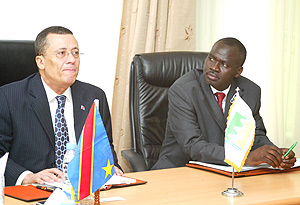KIGALI - The Democratic Republic of Congo (DRC), Environment and Natural Resources Minister, Jose Bononge Endundo, is in Rwanda to lobby for the country’s support to get Egypt and Sudan on board of the Nile Basin Cooperative Framework Agreement. The two countries remain adamant to sign the pact that will bind all nine members of the Nile basin. Disagreements on River Nile security have split the Nile basin member countries with Egypt and Sudan arguing that Article 14, Clause B on Water Security should state that “not to adversely affect the water security and current uses and rights of any other Nile Basin State” instead of “not to significantly affect the water security of any other Nile Basin State.”


KIGALI - The Democratic Republic of Congo (DRC), Environment and Natural Resources Minister, Jose Bononge Endundo, is in Rwanda to lobby for the country’s support to get Egypt and Sudan on board of the Nile Basin Cooperative Framework Agreement.
The two countries remain adamant to sign the pact that will bind all nine members of the Nile basin.
Disagreements on River Nile security have split the Nile basin member countries with Egypt and Sudan arguing that Article 14, Clause B on Water Security should state that "not to adversely affect the water security and current uses and rights of any other Nile Basin State” instead of "not to significantly affect the water security of any other Nile Basin State.”
Endundo, who is also the Chairperson of the Nile Basin Council of Ministers (Nile-COM), yesterday, met his Rwandan counterpart Stanislas Kamanzi, to discuss modalities of the Framework whose signing has stalled because of the reluctance by Egypt and Sudan.
Addressing members of the press after the meeting, Endundo said that his journey through all the Nile Basin Initiative (NBI) member states will hopefully see all the nine states adopt the 39-Article agreement during the upcoming Council of Ministers’ meeting that will take place between May 21 and 22 in Kinshasa, DRC.
"For the last 10 years we have been meeting to sort out these issues in order to transform the body into a permanent commission…it is important to bring all these countries to a common stand before we adopt the Framework agreement which will enable us to utilise the Nile waters equally and effectively,” Endundo said.
The reluctance on the side of Egypt and Sudan who are arguably the biggest users of Nile waters led to the delay in signing the agreement.
The signing and adoption was supposed to take place in June 2008.
The Nile Cooperative Framework Agreement seeks the establishment of a permanent River Nile Basin Commission through which member countries will act together to manage and develop resources of the longest river in the world.
Members of the basin include; Rwanda, Kenya, Uganda, Tanzania, DRC, Ethiopia, and Burundi, Egypt and Sudan and apart from the last two, the rest have endorsed the framework.
Kamanzi reiterated Rwanda’s support for the Framework agreement.
"Rwanda has greatly contributed to these discussions and we are committed to see water in the region utilised efficiently to support agriculture, energy generation and safe water for domestic use,” Kamanzi asserted.
The Cooperative Framework Agreement (CFA) was expected to be signed in September 2007 but it was delayed because of the controversial article.
The new agreement is expected to replace the one of 1929 but Egypt and Sudan, which are arguably the largest consumers of the Nile waters, are opposed to it for fear that it would limit their access.
Egypt and Sudan depend almost entirely on the Nile for their agricultural production and are major users of the Nile, which boasts of 84 billion cubic meters.
Egypt is guaranteed access to 55.5 billion cubic meters of the waters.
Ends


